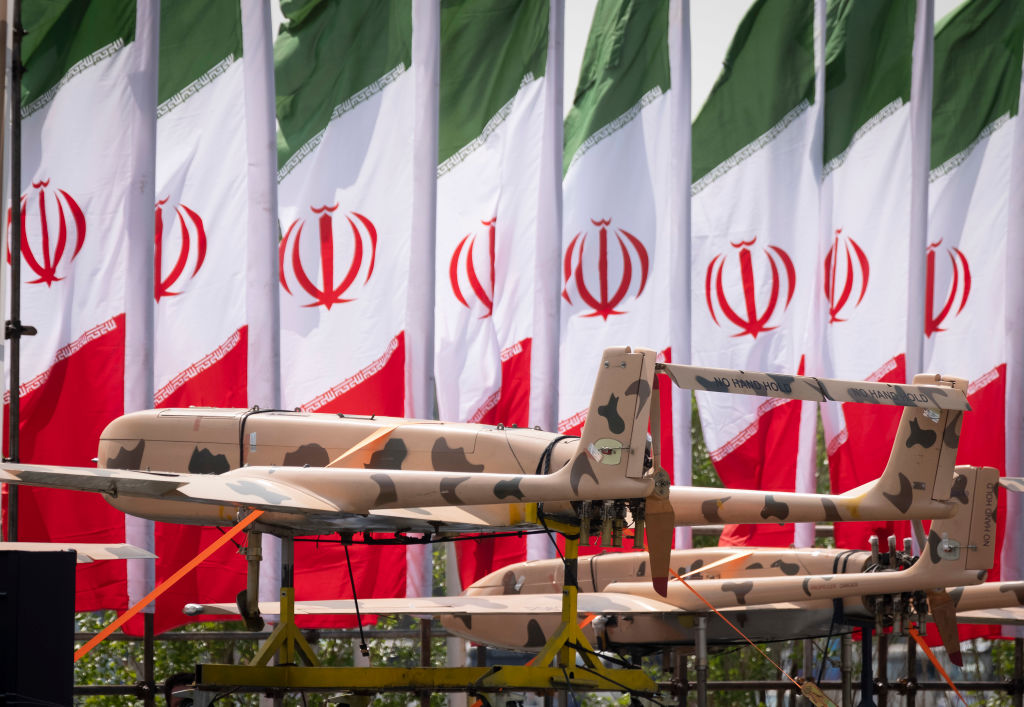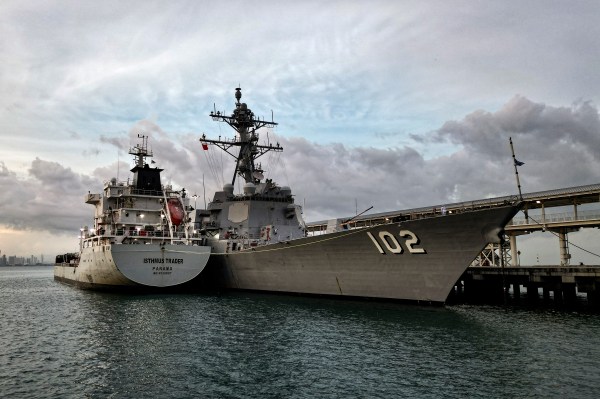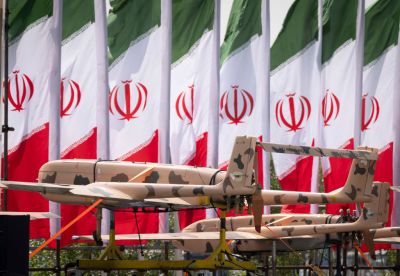TEL AVIV, Israel—The Iranian attack intended to punish Israel for its killing of a senior Quds Force commander in Damascus, Syria, instead became the proof of concept for a budding strategic alliance. Israel’s air defenses and warplanes—together with varying degrees of support from the U.S., U.K., France, Jordan, Saudi Arabia, and others—thwarted 99 percent of the 350 missiles and explosive drones destined for the country.
Saturday’s repelled attack provided the first real-world test of a yearslong effort by the U.S. to organize its allies in the Middle East against the growing Iranian aerial threat. Israeli and American officials hope to build on the momentum of the successful defensive operation by strengthening and formalizing the coalition that made it possible. And given reports early Friday morning that Israel had retaliated against Iran with limited strikes near the city of Isfahan, that coalition could be put to the test sooner rather than later.
“Going forward, we will be working to further isolate Iran internationally and increase economic and other forms of pressure,” White House National Security Council spokesman John Kirby told reporters on Monday. “So, that’s the upshot here: a stronger Israel, a weaker Iran, a more unified alliance of partners. That was not Iran’s intent when it launched this attack on Saturday night—not even close. And again, they failed. They failed utterly.”
But Iran’s failure was not for lack of trying, Israeli officials insist. The hundreds of drones, cruise missiles, and ballistic missiles fired at Israel carried more than 60 tons of explosives—a vast expenditure of ordnance resulting in what Israel Defense Forces officials said amounted to little to no tactical damage. In addition to its own cutting-edge air defense systems, Israel may have its friends to thank for detecting the attack before it even began.
Intelligence from Gulf states provided the first line of defense, according to a report by the Wall Street Journal. Iranian officials reportedly gave Arab countries, including Saudi Arabia and the United Arab Emirates (UAE), advance notice about the impending operation, which the countries then passed on to the United States. The early warning allowed the Pentagon to position its air defense resources across the Middle East accordingly and begin coordinating with its allies in the region, including Jordan, which agreed to open its airspace to American and Israeli fighter jets.
Once the attack began late Saturday night, radars in Persian Gulf countries signaled to the coalition that Iran had launched its first wave of attack drones. The U.S. Air Force ultimately shot down at least 70 drones, while American warships in the eastern Mediterranean intercepted between four and six ballistic missiles. Israel’s layered air defense system, meanwhile, neutralized the majority of the missiles that crossed into Israeli airspace, with the exception of a small number that struck and caused minor damage to a southern airbase.
“It was not a hermetic seal, but it was close to it,” Jonathan Schanzer, senior vice president for research at the Foundation for Defense of Democracies, told The Dispatch. “That was noticed by the Iranians, but also by some of the other regional actors who I think had to have been impressed with what they saw.”
Though the U.S.-led initiative to integrate the region’s air defenses predated the 2020 Abraham Accords, the landmark normalization agreement between Israel and UAE—and later Bahrain—ushered in a new period of deepened military cooperation.
Israeli officials hope Saturday’s successful test of these budding strategic partnerships might help the country reverse the diplomatic progress lost after the outbreak of war on October 7. Prior to the Hamas attack, a U.S.-brokered normalization agreement with Saudi Arabia had been just around the corner. “Hamas is an opponent of normalization. Hezbollah is an opponent of normalization. Iran is an opponent of normalization,” State Department spokesman Matthew Miller said at the time. “And they seek to prevent normalization exactly through these terrorist attacks.”
The war that followed has created new political obstacles in Israel’s diplomatic overtures to the Arab states, who fear being seen by their own people as traitors to the Palestinian cause. But the prospect of a deal was never fully abandoned. Throughout the conflict, Saudi Arabia has dangled the prospect of formal diplomatic relations in order to press Israel and the U.S. for a pathway to a Palestinian state and, likely more valuable to the kingdom, a defensive alliance with Washington.
In light of Iran’s attack on Israel, the latter demand is perhaps more important to Riyadh than ever. Israel’s Kan News reported Thursday that Saudi Arabia and the United Arab Emirates are seeking an American commitment to their protection in exchange for strengthening the regional defensive alliance against Iran that coalesced over the weekend. The countries are reportedly concerned about joining an anti-Iran axis without some sort of defense assurances from the United States, but a formal military pact—which would require Senate approval—could be difficult to deliver on.
Iran, for its part, reportedly warned Arab states against cooperating in the defense of Israel, saying they could become Iran’s “next target.” It’s not an abstract threat. In Jordan, Iranian-aligned groups have led efforts to sow instability and undermine the Hashemite Kingdom’s rule. In UAE and Saudi Arabia, the Houthis—a Tehran-backed terror group from Yemen—for years targeted critical infrastructure using Iranian missiles and drones.
“The kingdom has, for over five years now, warned of the threat of Iranian drones,” Faisal Abbas, editor-in-chief of the Riyadh-based Arab News, told The Dispatch. “Unfortunately, our closest allies chose to ignore the seriousness of our warning when our cities, civilians, and oil facilities were being attacked,” he added, arguing the threat was only acknowledged when the Iranian-made weapons made their way to the battlefield in Ukraine and Israel.
With Israel’s overnight retaliatory strikes in Iran, the coalition could soon face another test against Iranian weapons. In the early hours of Friday morning, the Israeli military reportedly used drones to target a military air base near Isfahan, a city in central Iran that also hosts nuclear facilities. Iran’s nuclear assets don’t appear to have been hit, but the limited Israeli counterattack near the sensitive site sends a clear message to Tehran: A direct strike will result in a direct response. If Iran moves up the escalation ladder, Israel is capable of striking wherever it so chooses.
Where Iran will go from here is unclear. Initial reports in regime-affiliated outlets downplayed the severity of the drone attack, claiming that the sounds of explosions were from Iran’s air defenses neutralizing a suspicious object. But Iranian President Ebrahim Raisi on Wednesday threatened Israel with a “fierce and severe response” if it carried out even the “tiniest” attack on Iranian soil.
Ahead of Israel’s retaliatory strike, President Joe Biden reportedly told Israeli Prime Minister Benjamin Netanyahu that the U.S. wouldn’t support an Israeli counterattack for fear it could bring about a regional war. “You got a win,” Biden said of the defensive operation. “Take the win.”
But if the White House wants to shore up the regional coalition that came to Israel’s aid over the weekend, strong American leadership will be required. Taking on such a role may require the Biden administration to rethink its longtime policy of pursuing reconciliation with Iran, analysts argue.
“Starting in 2009 with the advent of the Obama administration, the Democratic Party and the White House embarked on a policy of seeking reconciliation with Iran, not confrontation,” Michael Oren, the former Israeli ambassador to the United States, told The Dispatch. “If the United States were to pull a 180-degree turn and turn away from reconciliation to confrontation, I think they’d find an entire region ready to join them.”







Please note that we at The Dispatch hold ourselves, our work, and our commenters to a higher standard than other places on the internet. We welcome comments that foster genuine debate or discussion—including comments critical of us or our work—but responses that include ad hominem attacks on fellow Dispatch members or are intended to stoke fear and anger may be moderated.
With your membership, you only have the ability to comment on The Morning Dispatch articles. Consider upgrading to join the conversation everywhere.